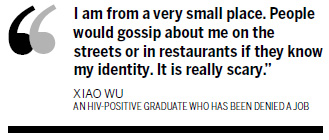China
First HIV job refusal trial to begin
By Zhang Yue (China Daily)
Updated: 2010-10-13 08:01
 |
Large Medium Small |
Graduate rejected for teaching post because of medical condition
ANQING, Anhui - A landmark trial involving a college graduate in Anqing who was denied a teaching job for being HIV positive is scheduled to start on Wednesday.
It is believed to be the mainland's first court case of discrimination against HIV-positive jobseekers despite widespread HIV/AIDS discrimination.
The plaintiff, going by the alias Xiao Wu, was denied a teaching job by the Anqing city education department in August after he tested positive for HIV.
He underwent medical tests, including screenings for syphilis and hepatitis C, after he had passed the written job tests and interviews.
The department said it rejected him based on the medical examination standard required for civil servants.
Xiao's lawyers, Li Fangping, from Beijing, and Zheng Jineng from Anhui, who have offered to work for free, arrived in Anqing on Tuesday morning.
"I think we have a good chance of winning the case, as denying Xiao Wu a job just because he is HIV-positive is against the Employment Promotion Law and the regulation on AIDS prevention and treatment," Li said.
Both lawyers requested that the trial not be held in public to protect privacy.
Xiao Wu is now working at a private school in Anqing, earning about 1,000 yuan ($147) per month. Though not his ideal job, he said it helped distract him from thinking about his condition. He said he wants the education department to review its decision and give him the job he deserves.
Xiao, in his early 20s, said he underwent a mental rollercoaster over the past month.
"I was not planning to sue the education department at the beginning," he said. "My first reaction after I was rejected was that I am still qualified for the job even though I am an HIV victim. I thought the local education authority would be scared if I sought legal recourse and they would offer me the job." But now he said he is beyond the point of no return: he has to defend his rights through legal means.
Xiao will not appear in court on Wednesday.
An official from the legal affairs division of Anqing education department, who asked not to be named, said on Tuesday that they will not give Xiao a job.
"I think no one is willing to put their children in the hands of an HIV-positive teacher even if the virus has limited ways of spreading," he said.
The department of education will not reveal any details before the trial starts.
Xiao, who declined to reveal how he became HIV-positive, said he feels that he is fighting for many others who are in a similar situation but dare not stand up because of privacy concerns.
Yu Fangqiang, a coordinator from Beijing Yirenping Center, a civil society that promotes welfare, benevolence and equality, has been trying to help Xiao since the case was filed.
"Xiao is not the only one suffering from job discrimination as an HIV victim," Yu said. "Yet none of them has turned to the courts as the risk of revealing personal information could be devastating."
During the past month, the media have tried to reach Xiao for interviews, disrupting his life. Xiao said he is now scared to be exposed in the media spotlight. Local hospitals and his lawyers are trying to keep his identity secret.
"What scared me most is that people around me will know that I am HIV-positive," he said. "I am from a very small place. People would gossip about me on the streets or in restaurants if they know my identity. It is really scary."
Xiao Wu said he was worried that personal information might be revealed during the court process.
He said he has not thought through how the trial verdict might affect him.
"At first all I wanted was to have this job and be a teacher, which is a legal right for me," he said. "Now I am worrying whether I would take the job even if I win the case. Every one in the education department might know I am HIV-positive. And the city will know sooner or later. I cannot even think about the pressure."
Zhang Lie from the Anqing people's court in Yingjiang district, the court handling the case, said that even though the case was believed to be the first of its kind on the mainland, the court will treat it as any other case.
China has an estimated 740,000 HIV-positive people, while another 50 million are considered at high risk, according to official statistics.
Xiao Wu said that he thinks that he has about a 60 percent chance of winning.
But he is still worried.
"I do not know what I will do if my personal information is revealed. I may leave my hometown and go to work in a remote city where no one knows about me."
At the end of this interview, he refused to have his photo taken, but wrote down two words - justice and rights - to show his resolve to defend them.
China Daily
